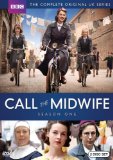| Reviews & Columns |
|
Reviews DVD TV on DVD Blu-ray 4K UHD International DVDs In Theaters Reviews by Studio Video Games Features Collector Series DVDs Easter Egg Database Interviews DVD Talk Radio Feature Articles Columns Anime Talk DVD Savant Horror DVDs The M.O.D. Squad Art House HD Talk Silent DVD
|
DVD Talk Forum |
|
|
| Resources |
|
DVD Price Search Customer Service #'s RCE Info Links |
|
Columns
|
|
|
Call the Midwife: Season One
"Call the Midwife...brought to you by the National Health Service's propaganda wing of the Beeb!". The BBC, through Warner Home Video, has released Call the Midwife: Season One, the two-disc, six-episode collection of the hit period medical drama that first bowed in the U.K. last January (its second "series" premieres tonight in the U.K.). Based upon the fictionalized accounts of author Jennifer Worth's years as a midwife in London's East End slums during the late 1950s, Call the Midwife is a surprisingly conventional retread of all those hoary TV medico shows you've seen countless times before, with lots of dimly-lit, mucky sets and mildly graphic childbirths to equal "grittiness," and some questionable revisionist history to make it all go down a treat. A little 10-minute official promo of the series is included in these excellent widescreen transfers.
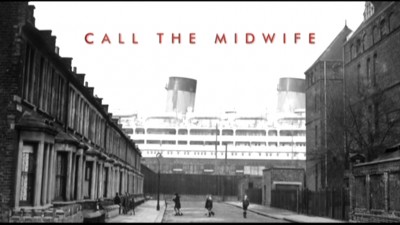
The post-war slums of Poplar, East End of London, 1957. Kind-yet-understanding, well-scrubbed, middle-class NHS district nurse and newly-minted midwife Jenny Lee (Jessica Raine) arrives at her new National Health Service assignment, Nonnatus House, unaware that it is in fact an Anglican nunnery, led by calm-yet-kindly, understanding Sister Julienne (Jenny Agutter). There, Jenny meets the House's other nuns, including commanding-yet-kind, understanding Sister Evangelina (Pam Ferris), bookish-yet-kind, understanding Sister Bernadette (Laura Main), and possibly demented-yet-kind, understanding Sister Monica Joan (Judy Parfitt). Living on-site with Jenny are two other non-nun district nurses and midwives: mousy-yet-kind, understanding Cynthia Miller (Bryony Hannah), and sexy-yet-kind, understanding Trixie Franklin (Helen George), with toff bull-in-a-china-shop-yet-kind, understanding Camilla "Chummy" Fortescue-Cholmondeley-Browne (Miranda Hart) soon to arrive. The House is maintained by genial Cockney scammer-yet-kind, understanding Fred (Cliff Parisi), while frequent visitors include Jenny's doormat incredibly forgiving-yet-kind, understanding would-be boyfriend, Jimmy (George Rainsford), and Chummy's eager-yet-kind, understanding London bobby suitor, PC Peter Noakes (Ben Caplan). Naïve about, and politely appalled at, the general squalor that greets her on her daily rounds, through the acquired wisdom of her poor-yet-kind, understanding "heroine" mothers, Jenny quickly finds her footing in her challenging new environment, learning about love and compassion and duty, in equal measures.
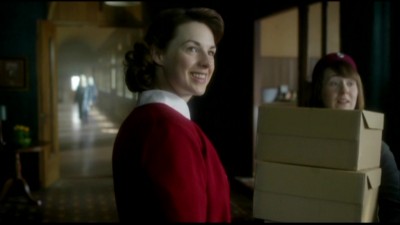
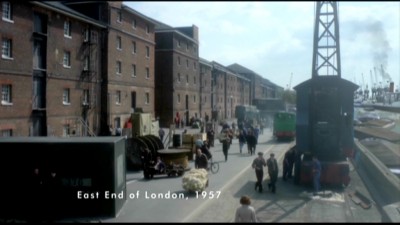
Is there anyone in Call the Midwife who isn't kind and understanding? I must admit that I was quite looking forward to seeing Call the Midwife after hearing how well it's done in the ratings, both here and in the U.K., and after having read so many laudatory reviews for it (both of which should have been a tip-off...). Not being sure whether I'd get some kind of comical Carry On... send-up, or a Mad Men-type ironic commentary, or a straight period piece drama, imagine my disappointment when Call the Midwife turned out to be nothing more than some gussied-up Dr. Kildare/Ben Casey/Medical Center/Marcus Welby, M.D./E.R. storylines, enacted by a stock company of overly-familiar, one-dimensional characters, all filtered through an equally obvious, clichéd, so-called "modern" approach that purports to show how things "really" were...but which comes off just as sunny and ultimately phony as the series it's trying to surpass.
I've never read Worth's books, so I can't say if these episode storylines come directly from her biographies or not (and I use that term with qualification, since the veracity of her accounts has been called into question by other historians and reviewers). However, there wasn't one of these episode plots―not one―that any regular TV watcher couldn't see coming a mile off, in both their thoroughly recognizable set-ups and pat denouements. Now, nobody likes conventional, "familiar TV" more than me; you can read a whole bunch of my reviews that essentially boil down to, "this is escapist entertainment, and it doesn't have to be 'meaningful.'" Had Call the Midwife merely remained an homage to earlier medico shows, without making noises like it was saying something "important," I would have been fine with that. And by extension, had Call the Midwife gone in the other direction, and become an uncomfortable, challenging re-examination of its depicted time period and context, I would have been equally glad at such an effort. However, Call the Midwife is neither fish nor fowl, with its amusing, helplessly glossy treatment of poverty (even the worst hole of an apartment is beautifully lit here, while those slum streets sure look clean...just like a museum dressed as a movie set), with its remarkably plucky group of characters who shouldn't all be so brave (cor blimey they all seem pretty happy to have syphilis and cockroaches), and with its faux-gritty plots that almost invariably turn out all right in the end (even a teen Irish prostitute who goes off her nut and steals a baby, is let off―even by the baby's mother).
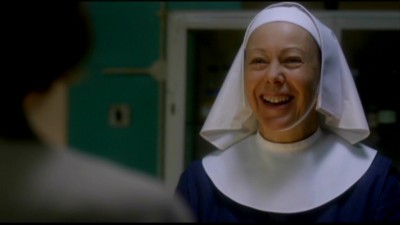
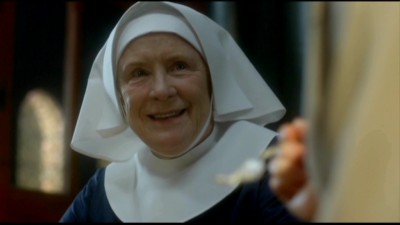
As with most calculated, manipulative popular entertainment aimed primarily at female audiences, so much of Call the Midwife is reduced down to the equivalent of cheap greeting card sentiments, masquerading as newly-divined, "enlightened" truths. Mawkish, Hallmark® twaddle like, "Hope is our protector and love our panacea," are served up as supposed small, knowing moments of emotional reality, as if the producers are saying, "if we have Vanessa Redgrave deliver this jibber-jabber in a soft, wise manner, well, then...of course the ladies out there are going to buy it." And yet when you look beyond the show's unrelenting bromides, there's no "there" there, no truly meaningful, complex, uncomfortable context in Call the Midwife. In the opening episode, older Jenny in the form of voice-over Redgrave, states that Jenny the younger knew nothing of life, particularly the passion that would make a woman keep having kids (even when all logic and socio-economic circumstances say to stop). Fine. I'm ready to see that series. Show me why these women are so passionate they not only keep having kids, but also by their examples, enlighten (and inflame) a closed-off, middle-class neophyte English Rose like Jenny. Only...the maddeningly dispassionate Call the Midwife isn't that series at all. If tat first episode is supposed to illustrate that central theme―a Spanish-only speaking wife has 25 births while her noisy, undernourished brood and amorous, happy-go-lucky husband, only wish for more―then it's a ludicrous, ridiculously romanticized depiction of so-called "slum passion" among "those types"―a stereotype, anyway, that only serves to show up the producers' and writers' own middle-class clichés concerning the great unwashed. If that passion is made understandable in Worth's books, it's lost in translation in the too-safe-for-words, bloodless Call the Midwife.
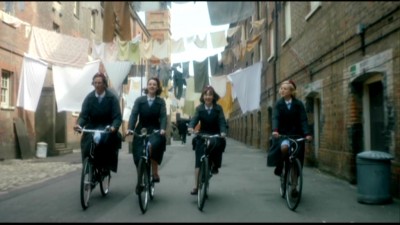
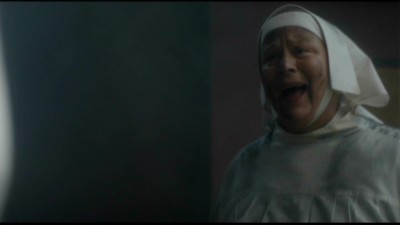
Indeed, Call the Midwife is far too gentle (or more accurately, far too scared) to approach its subject matter with any kind of real passion. We're talking about desperately poor people here, living in frequently appalling conditions, with selfless nuns and young nurses employing the crudest of simple instruments to help these women give birth―some cockroaches, some dirt, and a few realistic childbirth scenes aren't going to cut it if they come with the Ealing Studios stamp of approval. Where are the villains in Call the Midwife? You're telling me that in Worth's years as a nurse, she didn't come across one incompetent midwife, or a mother who wasn't glad to have another mouth to feed, or a nun that didn't act like she dropped out of the stock company of The Sound of Music? Except for the most dire of circumstances (which it then promptly ameliorates), Call the Midwife is so consistently sunny and upbeat and smugly proud of its own take on liberal morality, that it frequently borders on parody...if you didn't already know that the producers were dead serious about this pap. And while we're at it...why are all the women "heroines," as Jenny asserts? We keep hearing about how these women "keep going," but what, exactly, do they keep "going on" about, and for? And from what, to what, do they keep "going on"? This is poverty as viewed by college-educated writers and producers who see the "noble poor" as children who just need a little love and understanding for us to see through to their hearts of gold (the minute the mother who's brawling in the first scenes gets syphilis and started making Jenny retch with revulsion when she gets a sniff of her knickers, I knew Jenny was eventually going to just love this plucky poor person...). In Call the Midwife, we're presented with a series of tableaus, with no context or depth. This is shorthand drama; we're just supposed to understand, somehow, what these women are about, and why they do what they do, and then give them the benefit of the doubt because everyone is so damned polite and understanding and kind about things, with faux-grittiness smeared on to make us forget how surprisingly superficial is the exposition.
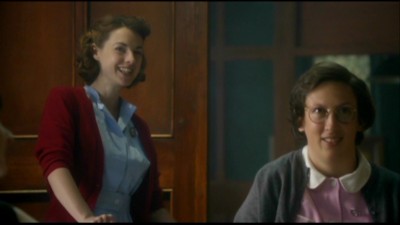
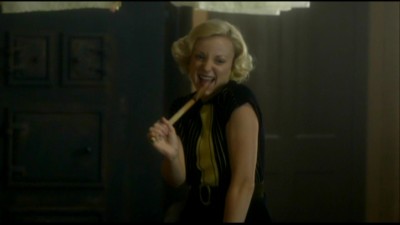
And please don't give me that crap that Call the Midwife doesn't "judge," as I read somewhere. It judges alright...just not anyone on the "P.C. friendlies" list (Chummy's rich, white, snobbish mother fits all the leftist-bashing criteria, so she's not forgiven for her "circumstances"). Since almost all of the women are hands-off for balanced (and possibly critical) evaluation, that leaves the men; however, viewers have become wise to years-worth of unrestrained male-bashing in television drama, so Call the Midwife takes a new tact and indulges in straight-up historical revision. Modern liberal fantasies of husbands and boyfriends abound here, from older, non-threatening, humorously scheming Fred, to sexless, ridiculously polite, even-handed, forgiving suitors like Jimmy and P.C. Noakes, to handsome, dreamy widowers, to highly unrealistic romantic fools (where the hell are the wife-beaters and the cheaters in these slums?). In the third episode, an older, overly-solicitous white husband doesn't even blink an eye when his white wife delivers a black baby, eventually delightfully pushing the adorable child around in a pram. You can question how quickly he accepts not only the reality of this baby but also his wife's infidelity...but his response certainly isn't an impossibility (even for 1957).
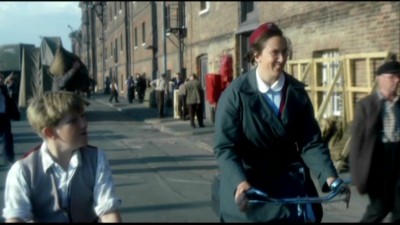
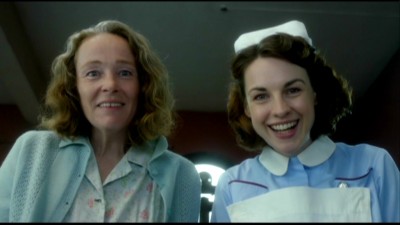
But what is indicative of Call the Midwife's sunshine-and-roses agenda is that not one other mother says anything when presented with this sight, either (or even seems put-out enough to make a face); they're all beatific smiles―not bad for a group of people who are portrayed here as not only unenlightened but positively backward when it comes to other social realities of 1957. Tell me about race relations in 2013's England, let alone 1957's, and then let me know how realistic you think this portrayal. Cripes, even incest―apparently U.K. TV writers' current favorite dramatic twist, considering how many times it keeps cropping up in the shows I'm watching lately―is refashioned as a "lifestyle choice" in this version of 1957 England; in the fifth episode, a brother and sister who grew up in terrible conditions in a workhouse now live as man and wife, but Sisters Julienne and Evangeline pooh-pooh Jenny's solitary moral horror at this, with older Jenny wisely intoning at the end of the episode that she eventually learned that "there were no versions of love...only love"―an alarming sentiment if you extrapolate it out to its logical conclusions (when crazy Sister Monica tells a courtroom that only God will judge them, everyone snorts and sneers―de rigueur for Britain's rabidly secular pop culture). Call the Midwife wants viewers to think it's showing them how things really were back in 1957 East End, but it does so by fostering and promoting a simplistic, suspiciously mellow, one-sided context that's as suspect as all those hilariously obvious plugs for the NHS that blunder their way into the scripts. Once the series begins to rapidly tilt more towards an out-and-out romantic drama focusing on Chummy's and Jenny's love lives, you can pretty much see what Call the Midwife was all along: a thoroughly conventional wind-up.
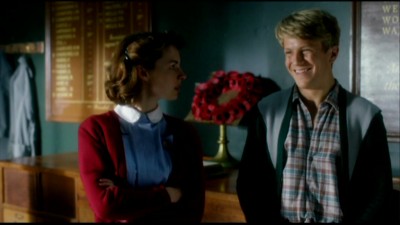
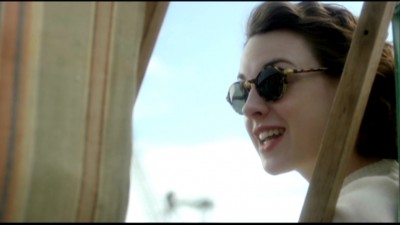
The DVD:
The Video:
The anamorphically-enhanced, 1.78:1 widescreen transfers for Call the Midwife: Season One are digital perfection: crystal-clear image, with delicately-valued color and no compression issues.
The Audio:
The Dolby Digital English 5.1 stereo mix offers discreet directionality, and zero hiss. Re-recording level is perfect, with no fluctuation. English subtitles are optional.
The Extras:
An official promo (10:00) for the series is included, featuring interviews with the cast.
Final Thoughts:
Phony from minute one. Nuns who don't talk about God or look down on sinners, nurses who never tire and who always care and understand, and the wretchedly poor who keep smilin' through, guv'nuh―no matter how many kids they have that they can't keep the rats off of or can't feed, in those picturesque slums streets of London's East End. Thank God the NHS saved them all. A rental, maybe, for some of the veteran pros here― Judy Parfitt is the only one to rise above stock with her "is she or isn't she crazy" Sister Monica Joan―is about the best I can do for the calculated (and calculating) Call the Midwife: Season One.
Paul Mavis is an internationally published film and television historian, a member of the Online Film Critics Society, and the author of The Espionage Filmography.


|
| Popular Reviews |
| Sponsored Links |
|
|
| Sponsored Links |
|
|
| Release List | Reviews | Shop | Newsletter | Forum | DVD Giveaways | Blu-Ray | Advertise |
|
Copyright 2024 DVDTalk.com All Rights Reserved. Legal Info, Privacy Policy, Terms of Use,
Manage Preferences,
Your Privacy Choices | |||||||









